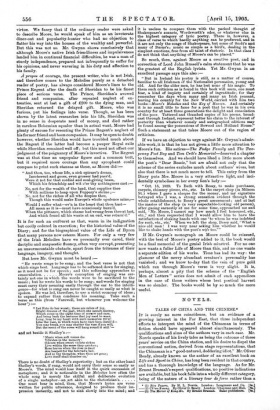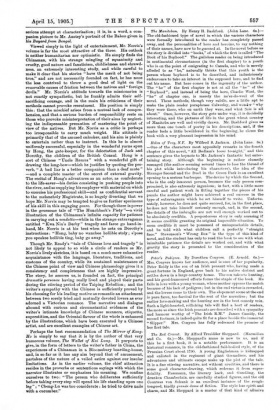NOVELS.
TALES OF CHINA AND THE CHINESE.*
IT is surely no mere coincidence, but an evidence of a growing interest in the Far East, that three independent efforts to interpret the mind of the Chinaman in terms of fiction should have appeared almost simultaneously. The qualifications and aims of the authors vary in each case. Mr. Norris speaks of his lively tales as being the outcome of three years' service on the China station, and his desire to dispel the conventional notion, derived from stage representations, that the Chinaman is a " good-natured, doddering idiot." Mr. Oliver Ready, already known as the author of an excellent book on Life and Sport in China, has long been resident in that country, and has a thorough knowledge of the language. As for Mr. Ernest Bramah's expert qualifications, no positive indications are available, but his book falls into a wholly different category, being of the nature of a literary tour de force rather than a
• (1) Ries Papers. By H. L. Norris. London: Longman and Co. rs.
—(2) Chun-Hwang. By Oliver G. Beady. London: Chapman and Hall. es. —(3) The Mirror of Hong-Ho. By Erneat Brattish. Same publishers. es. serious attempt at characterisation ; it is, in a word, a com- panion picture to Mr. Anstey's portrait of the Baboo given in his Bayard from Bengal.
Viewed simply in the light of entertainment, Mr. Norris's volume is far the most attractive of the three. His outlook is neither humanitarian nor optimistic. He simply finds the Chinaman, with his strange mingling of equanimity and cruelty, good nature and fanaticism, childishness and shrewd- ness, an extremely interesting study, and while careful to make it clear that his stories " have the merit of not being true," and are not necessarily founded on fact, he has none the less contrived to throw a good deal of light on the removable causes of friction between the natives and " foreign devils." Mr. Norris's attitude towards the missionaries is not exactly sympathetic, but he frankly admits their self- sacrificing courage, and in the main his criticisms of their methods cannot provoke resentment. His position is simply this that the mischief arises from a mutual lack of compre- hension, and that a serious burden of responsibility rests on those who provoke misinterpretation of their aims by neglect- ing the indispensable precaution of mastering the point of view of the natives. But Mr. Norris as a critic, is perhaps too irresponsible to carry much weight. His attitude is primarily that of the amused onlooker, and his aim is plainly to entertain rather tha,n to instruct. In this he is almost uniformly successful, especially in the wonderful yarns spun by Hong, the gate-keeper, for the delectation of Jack and Dorothy, the children of the British Consul. Hong is a sort of Chinese "Uncle Remus" with a wonderful gift of drawing the long-bow—which he justifies by quoting the pro- verb, " A bad liar is a better companion than a deaf mute " —and a complete master of the secret of external gravity. The recital of Hong's adventures as an actor, as confederate to the life-saver—his duties consisting in pushing people into the river, and so supplying his employer with material on which to exercise his professional skill—and as confidential servant to the melancholy Magistrate, is so hugely diverting that we hope Mr. Norris may be tempted to give us further specimens of his skill in this engaging genre. For though there is power in the gruesome tale of "The Hunchback's Piety "—a vivid illustration of the Chinaman's infinite capacity for patience in carrying out a vendetta—while in the strange extravaganza entitled " Kwa Niu's Derby " tragedy and farce go hand-in- hand, Mr. Norris is at his best when he acts on Dorothy's instructions : " Hong, baby no wanchee hollible stoly ; s'pose you speakee hollible ting, baby go away."
Though Mr. Ready's "tale of Chinese love and tragedy" is not likely to appeal to so wide a circle of readers as Mr. Norris's lively sketches, it is based on a much more exhaustive acquaintance with the language, literature, traditions, and customs of the country, while its sustained maintenance of the Chinese point of view and Chinese phraseology gives it a consistency and completeness that are highly impressive. The story, he assures us, is founded on fact, the principal dramatis personae having really lived and played their parts during the stirring period of the Taiping Rebellion ; and the writer's sympathy with the Chinese is sufficiently proved by his choosing for his leading motive as romantic an attachment between two sorely tried and mutually devoted lovers as ever adorned a Victorian romance. The narrative and dialogue abound with curious and circumstantial evidences of the writer's intimate knowledge of Chinese manners, etiquette, superstition, and the Oriental flavour of the whole is enhanced by the illustrations, which have been executed by a Chinese artist, and are excellent examples of Chinese art.
Perhaps the best recommendation of The Mirror of Kong- Ho is simply to say that it is by the author of that very humorous volume, The Wallet of Kai Lung. It purports to give, in the form of letters to the writer's father in China, the experiences of a Chinaman in a Bloomsbury boarding-house, and, in so far as it has any aim beyond that of amusement, partakes of the nature of a veiled satire against our insular limitations. As in the earlier volume, the chief attraction resides in the proverbs or sententious sayings with which the narrator illustrates or emphasises his meaning. We confine ourselves to two : " The person who deliberates sufficiently before taking every step will spend his life standing upon one leg" ; " Cheng-Lu was too considerate ; he tried to drive nails with a cucumber."











































 Previous page
Previous page